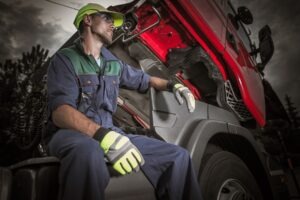
Thousands of trucks travel Florida roads every day, bringing goods and materials to businesses and consumers in every corner of the state. But while large trucks are vital to the economy, they can be extremely dangerous. Trucks are much heavier and larger than other vehicles, and a collision, or even a single-vehicle semi crash, can be deadly to other motorists, pedestrians, and passersby. A heavy commercial truck weighs more than 10,000 pounds even before loaded with cargo. The cargo can drive the weight to 80,000 pounds. Even a commercial truck officially classified as light wins that designation that weighing less than 10,000 pounds—a size much greater than a car weighing 2,000 or 3,000 pounds.
In Florida, large trucks were involved in 25 fatal crashes in the last year for which statistics are available, according to the Florida Department of Highway Safety and Motor Vehicles (FHSMV). Light trucks were involved in another 10 fatal crashes. Or to put it another way, 35 people lost their lives in commercial truck crashes in one year. That’s almost three per month on Florida’s roads.
And there’s more. FHSMV also found that accidents involving heavy trucks caused 133 incapacitating injuries and 279 non-incapacitating injuries in the most recent reporting year. Light trucks caused another 58 incapacitating injuries and 249 non-incapacitating injuries.
Truck driver error likely caused many, probably most, of these accidents. A study by the Federal Motor Carrier Safety Administration found that trucker error caused 87 percent of truck-involved accidents. What leads truckers to commit these errors? The frightening answer is that some are simply unqualified.
A Labor Shortage in the Trucking Industry
The trucking industry is in the midst of a shortage of drivers that many industry experts characterize as a crisis, particularly in Florida. A strong economy has led to a rising demand for products that are carried by trucks, which means that more trucks are running at any given time. There is a shortfall of available drivers of as much as 90,000 nationwide. The truck driver workforce is also aging. A large portion of the trucker workforce is approaching retirement age, threatening even greater labor shortages in the coming decade.
As a result of the squeeze on trucking labor, trucking companies sometimes hire unqualified drivers to fill the shortage. This is illegal, but it happens. And an unqualified truck driver behind the wheel poses a danger to Floridians. Trucks are far more difficult to drive than cars, as anyone who has ever rented a moving van knows. An unqualified truck driver who thinks he can control a big rig or large box truck just because he can drive a car is in for a potentially deadly surprise.
Expect More, Receive More: Legal Support That Feels Like Family
What Makes a Truck Driver “Qualified”
For good reason, Florida law tightly regulates who can drive a commercial truck. To become “qualified,” drivers must obtain a commercial driver’s license (CDL) and, depending on the loads their trucks will carry, must also obtain special license “endorsements.”. The laws and regulations establishing these qualification levels aim to ensure that commercial truck drivers know all about how their vehicles operate and about the dangers unique to those vehicles.
To obtain a CDL, a driver must:
- Meet basic vision and reading requirements;
- Pass multiple written tests assessing general trucking and road use knowledge, the operation of “combination” vehicles (i.e., tractor-trailers), and the use of air brakes.
- Pass additional tests specific to any endorsements, such as for driving a truck carrying hazardous materials; and
- Pass on-road skills tests with an assessor who rates the driver’s ability to safely control the truck.
CDL regulations also mandate that license holders know how to inspect a truck before driving it. The Florida CDL Handbook gives a very specific itemized list on the latter, indicating areas to be checked on the vehicle for safety and adequate responsiveness. The inspection also includes inspections of cargo, to make sure it is adequately secured and balanced.
Drivers studying the Florida CDL Handbook are cautioned about the effects of alcohol and drugs on safe driving and alertness, which can be significant contributing factors—or sole factors—in accidents. Truck drivers are routinely tested for illegal substances and alcohol.
They are also cautioned about the dangers of driving when fatigued or sleepy. A drowsy truck driver is as unsafe to himself and others on the road as a drunk or drugged driver. When obtaining a CDL, drivers learn about the extensive state and federal “hours of service” regulations that limit the number of hours a driver can spend on the road at a stretch before resting, and that dictate the records truckers must keep of their hours.
Finally, drivers studying for the CDL are told about the necessity for reporting. They may be required to give periodic official reports of the condition of the truck, for example. They may be required to provide reports about the load after specific drop-offs or at specific times and weigh stations.
A driver who does not take the steps to obtain and maintain a CDL, in contrast, may not know important information or have critical skills. That is what makes it so dangerous for trucking companies to put an unqualified truck driver behind the wheel. Unqualified truckers are not bad people. They don’t want to get into accidents any more than anyone else does. But the fact is, trucking requires a specific set of knowledge and abilities, without which a person driving a truck puts themselves and others at risk of serious injuries and fatalities.
What Accidents Can an Unqualified Truck Driver Cause?
Unqualified truck drivers can cause almost any type of accident involving a commercial truck. Here are some of the most dangerous accidents that can result from a truck driver’s lack of knowledge about his rig.
- Rear end accidents and pileups. Trucks take a long distance to come to a full stop in dry road conditions, and even longer in wet conditions. A trucker unfamiliar with stopping distances who approaches slowed or stopped traffic in front of him risks traveling too fast for conditions and/or applying the brakes too late. In either case, the truck can plow the rear-end of slowed or stopped vehicles, causing a devastating and deadly pileup.
- Rollovers. Trucks are long and top heavy, which makes them ill-suited to make sharp turns at any speed. A truck that approaches a typical, curved on or off-ramp at excessive speed has an extreme risk of rolling over. Qualified drivers learn about this danger in training and practice navigating sharp turns over and over before they ever receive a CDL. Unqualified drivers essentially “learn” these lessons the hard way, in real-world driving conditions where an error can end up causing catastrophic injuries and fatalities.
- Overheight accidents. Trucks are also tall; too tall, in fact, to drive under the thousands of bridges and overpasses that criss-cross the nation’s highways and back roads. Licensed truckers know to pay special attention to the height of their vehicle and to avoid roads that pass under structures with height limitations. Unlicensed drivers who lack the qualifications to drive a tall truck risk ignoring these limitations. The result: a potentially deadly collision with a bridge or overpass that shears off the top of a truck.
- Jackknife accidents. An experienced, licensed trucker knows that his trailer often carries cargo that vastly outweighs the tractor truck pulling the trailer. Truckers must be careful when applying the brakes to ensure the tractor and trailer stay aligned, so that the trailer does not push the tractor sideways, perpendicular to the direction of travel, in an accident known as a “jackknife.” Inexperienced, unlicensed truckers lack the awareness of this danger, which can lead to catastrophic accidents in which a trucker loses control of his rig and slams into other vehicles or objects.
- Run-off-road accidents and head-on collisions. Truckers who follow the rules of the road and the trucking industry understand the critical importance of getting enough sleep and avoiding alcohol and drugs. A sleepy, drunk, or drugged truck driver risks steering his rig off of the lane of travel onto the shoulder or into oncoming traffic. Unlicensed truckers run a high risk of violating “hours of service” rules, and of operating while under the influence, with deadly consequences.
How Do I Know If An Unqualified Truck Driver Caused An Accident?
If you or a loved one have been in a Florida truck accident, how would you know if an unqualified truck driver caused it?
The short answer is, you probably wouldn’t. At least, not right away. Even if a truck accident seems to be caused by driver error, such as running a stoplight, the fact of the driver’s qualifications will not likely be immediately obvious. Even a qualified driver might run a stoplight from time-to-time.
Fortunately, law enforcement can check a trucker’s credentials and quickly determine whether he has the right to be operating his rig. That is why an accident involving a truck must be reported to law enforcement right away. It’s the law.
In the immediate aftermath of a truck-involved accident, stay at the scene and call 911. “Staying at the scene” does not necessarily mean staying exactly as you were when the accident happened, however. Move to a safe location out of traffic and danger, before you call.
The law enforcement officer who arrives at the scene of a truck-involved accident will prepare a report describing the details of the accident available at the scene, such as its location, the vehicles and drivers involved, and the apparent cause.
Always obtain a copy of the police report from any accident in which you were involved. It may prove useful to you in the future if you take legal action for damages.
Who Has Legal Liability for an Accident Caused by an Unqualified Truck Driver?
As a Florida driver, you probably already know that Florida is a “no fault” auto insurance state. That means that if you sustain injuries in an accident, the first source of insurance benefits you turn to is your own “personal injury protection” coverage, regardless of who caused the accident.
Florida law permits you to seek compensation from other parties, however, if the accident caused severe injuries or a fatality. In that case, the party or parties whose wrongful actions caused the accident and your injuries/losses may face legal liability.
So, an unqualified driver may certainly face liability for causing an accident. But the problem is, unqualified drivers may not carry adequate insurance or have any assets with which to pay you the damages you suffered. Are there others who may also have legal liability when an unqualified trucker causes a devastating crash?
Often, the answer is “yes.” Truck companies and owners, for instance, have a duty of care to make sure that their drivers are appropriately qualified. If they hire drivers who lack a CDL, they may also have liability for the driver’s actions. All trucking companies should check to ensure their drivers have the necessary qualifications.
Likewise, an unqualified truck may fail to spot maintenance problems with a truck. The company or contractor who services the truck may have legal liability if those problems led to an accident. An unqualified trucker may also fail to recognize when road conditions are unsafe for trucks, but the fault for the road condition itself may lie with a road agency or landowner who did not design or maintain the road in proper condition.
Can I Recover Compensation if an Unqualified Driver Caused an Accident That Injured Me?
If an unqualified truck driver caused a crash that severely injured you or a loved one, you may have the right to take legal action for compensation. This may include payment for:
- Medical costs
- Lost wages from work
- Prospective medical costs, if you will need surgery, hospitalization, or rehabilitation in the future
- Prospective lost wages, if you will unable to work for a long time or if the accident rendered you unable to work
- Pain and suffering
- Loss of consortium
If you need more information or assistance, contact a Florida truck accident attorney today.






